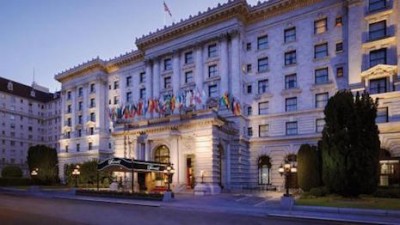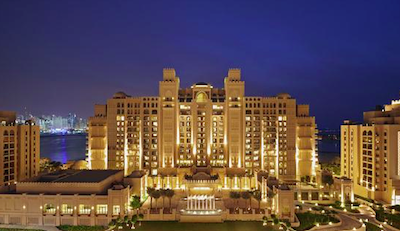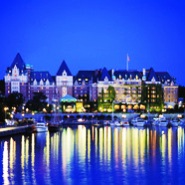Travelers place an enormous weight on concocting a psychological connection to a destination, according a new report by Weinman Schnee Morais Inc. commissioned by Fairmont Hotels & Resorts.
“Luxury Insights Report: Stewardship of Iconic and Historic Buildings” is the first in a new series of research reports focusing on current trends in luxury travel that Fairmont will undertake. The series of reports will help Fairmont and other hoteliers check their strengths and weaknesses against consumer desires.
"This Fairmont research shows that today’s traveler exhibits higher levels of interest in active and creative cultural participation, rather than passive observation – something they are looking for whether they choose to stay at a luxury hotel or home-sharing service," said Alexandra Blum, vice president, public relations and partnerships at FRHI. "Luxury guests are not only looking for warm and engaging service when traveling to world-class destinations, they are also following their hearts, which is why our colleagues strive to bring this authenticity to life in ways you can only experience in a luxury hotel."
Reflected through history
Great service is no longer enough for travelers; instead, consumers desire cultural immersion and a strong sense of place, and hoteliers must follow suit. A brand-first ethnographic study included in the report focuses on the ways in which Fairmont meets these desires.

Fairmont San Francisco
Instigating the study, Fairmont found that 75 percent of its guests say that “capturing the local culture of the destination” is extremely or very important for their trips. In support, the study found that more than a quarter of United States international travelers see themselves as “sophisticated explorers” whose top priority when traveling is to explore new cultures.
The top priorities of travelers overall are to connect to a destination emotionally – something a hotel can do by placing itself within the locale’s history – and that commodities and souvenirs are less important than experiences. Hotels have long operated in this manner, with cultural immersion initiatives being commonplace across properties.
"The emotional connection guests feel to each of our hotels is unique – whether it’s finally crossing off a bucket list trip, exploring a new destination, or celebrating a milestone event," Ms. Blum said. "We found, for example, that history lovers repeatedly choose Fairmont: in 2015, 38,000 “history lovers” stayed at more than one of Fairmont’s historic properties."
More specifically, however, the report shows that “bucket-list” experiences are particularly desirable, and that consumers are willing to spend more money on having one than ever before. This is closely connected with social media, which allows travelers to stay in contact with a large circle of friends and share their experiences. Under these circumstances, unique experiences that cannot be replicated elsewhere are particularly desirable.

Fairmont Dubai, United Arab Emirates
For Fairmont, many guests consider staying at one of their properties as a bucket-list goal and an accomplishment in and of itself. This fact speaks to the brand’s success at cultivating desire and selling itself as a supporter of experiences rather than as a mere status symbol or even a mark of great service.
The study also found that consumers are particularly fond of Fairmont hotels for their ties to history. Recognizing that this is a point of differentiation can help Fairmont with future marketing efforts, which will need to maintain its sense of history to stay true to its brand but also can branch out in strategic ways to capture a market segment with other interests.
Cultural specificity
Culture-based and heritage travel are important to U.S. travelers, with more than half engaging in such activities while traveling abroad. The closely related trend of voluntourism is also growing.
Traveling is an increasingly popular way for people to give back, and hotel brands must stay on top of the trend to maintain their status as the best in the business.
A recent study by Tours.com found that an astonishing 55 percent of America-based travelers partook in volunteer work during a vacation within the past two years, with almost three quarters calling their charitable donations or philanthropic endeavors “important,” “very important” or “extremely important.” As “voluntourism” becomes increasingly common, brands must show that they care equally and assist travelers in partaking in volunteer work or gifting to maintain status and image (see story).
In addition to Fairmont, other hotels also promote heritage in a culturally specific manner.
For example, The Mandarin Oriental, Bangkok is taking guests on a trip through time to celebrate 140 years.
The hotel will host a number of culinary, music and dance events, exhibitions and CSR initiatives throughout the year, emphasizing the hotel’s ties to various historical periods and figures. Turning a hotel into a destination will attract visitors and also positions the Mandarin Oriental as a culturally rich and creative brand (see story).
"Our global leadership position as both a steward of these historic and iconic properties, as well as the luxury operator of many new hotels that have already established themselves as the icons of tomorrow, differentiate the Fairmont brand among our stakeholders – travelers who visit our properties, developers looking for a brand to manage their building or a city leader trying to understand the significance of a property in their jurisdiction," Ms. Blum said.
{"ct":"HgCNt8wqGeQS239OSJPFza6r9So6K34VF9EJsnClFDI4NqkygkKgUw1eDgzEYIFuLCdLBeXH2crWLee\/tsba+Lo4o+DaeA+RytPEkd48LXuRA2bvDCqPMOhC646fFNttYY0qd+Mzf7V1l1CqH9mct1V0pQ8EMG89BJsBh+gkZU7uaFgN2iRcmxDG7gSXYDxgVaWz28UhergTFrY4sdd4pqnFtncr0\/nh\/R+2z3YgifXYlP\/qMFzmWsWeohJGIb8PjQgbh+18kl\/e+JrW8ey5Mre0IKaXpoSmafczRmgWiL94Ym1iI6hNnOyPteBsyN8HwX7jQlReJMIxxrJGFIEuELD+ZuclU6wnDm\/nBdzUWvl51\/s6ZAvr7bxJ6dvQRlcM3EJt2cc9+s4KbP0+Zw0UHqZdJ9DkCL1YO13wtdDKxhYyvz7m7gKaHnujRydenmCLS\/8oA3Me9zIrtu4ASCeVianONJAQLNjRAsi2uFY4oqRXDXTfCt7zrh\/c\/0xRxsw05wWtiBFx9Dr8QfhnIeppDCtsb5vphN\/7f2T6PZixsRwL0xuByuqHfj1xGETGwhs0i7VV9z7D6fpoM6EtS2gQjmHkQAnN45TSsco\/boXEUhgenphmSpOgS+uw5l+S2iWiX828oIxGFPsFy3NHECY\/qGADXQuir0vrmZsSEu8pkXIbbnLtSS1tP9S+oNg2mqKrzaDyBTA6I3DZXlwTiU96UD6te92J71MmKcs6BLVMzrWUrLgiciEf2yOrvlOaYzV+XaMHZIvGN2+yzHbgzB5l2pA2KkcEmjsJ9zcqCHkhGMwc8Rmj1NH7g9niz6+m2V+8YWUNKy9hZW1sDDsbbhEHR6K5vQ6f61RxHmtGF2Jt2eYbt+i2mqJgKNWSpKtzOEQIKApPMhLdhGc4F4qyfmRhHUY9RqKyS6YFTSREkP8LHQDw6bzAe1Brqam\/+ViLgxW92zqwGo1apsGZ9Q9GWSaf\/kTrTFXAoRvwfTjEFpxyf8kmiFH3nsPUFdr5re8w+fcfpKaK91WYNvByISHDKcMcUeF9B0veNCd97SLOECByuWvfeMnzMcioz74SiOrtm9PcI53fZ+vgxR16ZXTWA+XNbk+LqAyCDLaADFb2+2uI\/nfu0x7hDlZmDMpGkdCyh7+zTM5H1A6WDeQwpMcudJSp2AyH5pEaZhCYjslurt1R9TcmT91FxESZgmON3omrJc3X+rUnmXqnWX1\/RSHdeAOmzjCLFM0iQ1oV2IMridp4o1yXIrYZxfi8QB\/FlxAW0lBLNwUNpHhGKrAnBO4ojQXNLb9DRZRqc25mx6ajCzoZR+v5\/Z7KgKWH9owTFvSVPjNTFkbTv31psBR7rkASzCZ2Up4FW7qaMB6ETXSRoVlTmgwHBl0l9O8Ql2K7kDDRrj\/9Nt82r3ggr\/Q3wG+NqU1PeptVujkT5Qp+14g\/t\/OYlCtbxOvFH03M\/Y5aVnlJ3SNvUCSpow74eiTdg2ffz7TJ7IOanuIPuRsWpHFHSbLbNGZGKMj3tDOwsggYKDV6bV1fwwTX2hHwHmfEHkyP\/Fu+ls+CaeDZrLx5sad8nVIZLJcxcgIKS+K06fzxhIydXYMtC5JXIVd+ZSQaLxrH7is8V8yzg+Ts1Lc4PuUVRm\/+HkShUR6E7EnBaP0L0g\/\/afZt410QxkQs5HdQpUgvRKJEQ8EOqZE3sZIemp9wyOs1z6czhkDGZk6wsgnFZOwiWJjYAXeYPbNkcUK25Ue54ba3IjHsIBhPJix\/GJMirjLYiKFiRpW5PLoUJiMlYk\/FFD5cxl+9UYictMg5jqF2ulnmVkXM2y1engfgjWXywqHTgHoyFNbYQDGS1lBAVxWOwbYakCF43t+UZ+8t52SH96DRdSL4e9v7ByUvXYw2GYhvR\/xSSh19MebJJGeYngu+vmNuOBxuD6ivu3xFg34wbXaTGD5gl6C7NwtdTr+Om2O0j\/jk4dQQciHr9mS4I0QECK8hYGZyjIOiwsctvoBojfn6aNuII\/i6OwNCbzzhjDRsSaK9XlCQc5kaAyD9gF1rcqacAvBd4E+y+ksLum5fWgCVZWsVEOBKflPJxE6\/nbtaY+uaxFGRiXl8p4U2P5tN2tTwIqqXG1bh8tajpkklNuthqq6CvkAM1CvrW\/qvZ1jMHvtUXcg6C0ELfZAnu9ijUQBB9JRhsMNhXHXOky2f98lWQVIo5Lal4ZJ5cb6zSZjLQ+c0Pv6WO6ijbciCXoSkaVMRQuosnmuTpM9YiXM+Gqfp4E+dPJk8TBr1RYS9311KS0P65EXuvtDIfr0Uk8Nn1xM8eDbvAbuNuwKIan0uPHPyHZxjCJIPuM\/bsLrVSfJ+iMuHHvn1naxP7Ik0W3hLvDvGCadfmZklkUD+\/MYQ6XNCZJJmgnrNENfBaY8Hm1Y1PSMhTXmvBHELIcZlxYxZw0xZIlTvH\/y9mHSIElD\/3RLCasMAHKVLl3t10i\/xK6AfTeDg0nTt9gG9ccSY3lQzxdfc8DrRmToTf9NkrdLy2ImgEO56jF4AP17vgFrKXZNB4m5B+B1xS3Lhx25mVJOel1w3aPK\/8iz3\/Yf2QkrAwd9HeY78Lfq6zULFQNohdctLKpP5taDElv9oTlbGdK9nklrrkiXtcz3VHSgZMDEG0849PrUIUxa5p4kXv5GkXeMUU44iASJsRYbplfj+7ZHEvb2IItB05An0ZvAsLg8i\/mB4xzBZmcKhGuVFZmzdlTkzc1\/k+kwGOwJSPBydZFETejdtkRGGIV0LsXNOcuDz1Kobvk9eNLYu56z2+C7KqDA9SeURA3KJiHBOh68ciY4c6yJZB2\/wgm0eVFK3FnTQp\/kP+gcznF8nf8SJDHYz6tnbkfb3EseOTljmicEJ0bv4ndy8hFa0BCOesw7k8+6DXOMPGvU9eL4hojcftH1\/jInxPcxPrDnAjhN4dXNztlyhmdPyUo19maYdPiC38wis9PnEJryiZcO19MkhLQ4BifG\/XutSgdShE\/enxqhVi0ZN5znPrx\/c2WHnUxyrOs9iavXJ27XOtm+V2PaSwv6P+TItr2sBBzhG14LBidX\/gqYVa+UKBThSxw2PtfP4lEY0P1\/GHUdznHIoOWiabqnjpqhtw\/0uv1NDU\/mrvuO9R8EMwHFKsI4zN84xKMmUn0SB2IF2Iup0W+5LlBhtCq6VLNdV1Eynk\/lyJ0ywRgowSOag7GnWsk9Tf05j1t8C0drNV1TAgSPl8EX0Ar7Eq3PWiNzF5V59PjwgPgl0nuESrehcbYLpJRgS4bU58laMcZnpZCLo9JnorZwYZ5XmGkQOsIYdOZnE6iF2lDy6YGehzf3kIsr4XKsuetbR1fVB8lG4M9qtRehQwpOYWflW70wGyCmmwnc\/0kgwohTZZD7ThG20\/q1VBmFykHDQqfq5UFjM2oerv+UapI8Je9pluX0Xl3kTlUnlHz1EEgbjQXjl2JKum4rNF8\/6Y8NtfixbtNwh1mx6uqgjFwWFCPWlL7kzlsGmRe5jo\/Puk3LwdW9C5JMeLtsN4EgdJxCTAPbyQaDSbRoWhWMfFR9cK8gas45bVEZq1HcANPH2wPudViWDR8MWznN6RzkG6uv6LlPZsslMphp2qLOrET1ZFVTZ1tN3BA4OQ7zLE3y1bAas4iNKzH5SJCwnVIQtng9iBV6bpBHGLjDK\/dBZRPB4sXDXMmGxCgV3FydjYmNzE8mA995l5WozeUgKU\/kHyC0BbqJPwzF+LzuXP0IoqqzHQuJ5EbHo3XQ1svzBGvrah7GzERoxc1hZHVqLVYGwUcHzAJjGT+ObVutEyI649eVeyywzbULoIUoX7tnrq69yCnqWdMK77euY0TevkrqjFvXFvrG\/rqUNhVaeosbFwfjU7BIRxONASHlNFOjsCntfjvF+kjAoMtKRJtWP8kv466pAIu+CCgQuyQ\/DIYUfIUswkZpOBOqMSFdmeeIkPKCHUllglzUKO7sZ9ncq9Ps+wW9NQLiDDsOB\/pFTtQSG8d5mUwxOY\/S7bX+g3w98Y1s5akaS3lZSnXvDJRjYC9mRjYiseVz0rREDulKuWvFlGxaN11K5fRoShIfuiAZ\/HIJhzPsWmObu0tZb6ED62qJ8LJHxEn6qLxqJjS1coQY2NKV+uK2zBuLbUR5zCraJXKYKWqM5hyv8RjYcJOxfZ9lYoRQTccYp2eO7ImP9T2514l2y3PEVf2sTmKBpYpjYDWh4C42vJUK4+BcMg0hr\/z7Ml2s7PfEHtmkHOBXT+qp8\/GmlHGC1oVrBx9Rz1DNKoPraBzOY+gajeNGZLQBx8FGetBSO7+oN2JuGK9gpwjKqFGzGqZFfPy7AWkAjWumeUXP9QIGyU\/ZhX76AJFrNPz6bgFzSBsnPr40KZ2UPmJboKXEiFcc3UZjKTtw1v1giCJhQHqwguHcKMlSem7vWcZ82+FTfQPIvv6rykBp1ccFo4IA5NdZsxHS76WjBNo2jFoBk9Tmh9Gi3BEuvLmyC\/RGJjZyg7au+BQqNf79\/ToneammOfuVMwWdLwETJs0dQtw1BmBxAqr30XdINW\/UXDIgl\/5qCJZa76kgzsOIzOlOOEIVITDVq6MrI+tOQiziCw7U80gkLifhqV8S5o9Jux5IMPZ7ONte2t7kD7J0xiEsrnS3jVziYmCfT\/LnsxinHdWgyTb4IoWB+EBWPqEVXxtdGDLhtBtgMaG809XNc\/Q7F+iXC2CP1TINjUnPEXBQQRdCCcu7TZBKKrH9zE9B\/ETsgimi9IgIIvb9pYxw5O4h9T\/E3DtZGOybKmLUjg0t2+KTXEW5rg\/BTyUEGj1W4aGHXYCVGJ\/ujzHfxrdKRjkEurVjP5kePApxL1IxvdGuBSlhiPu8aifXjLs\/WqIg1ZsV+nofbZE6vO\/VHIO+5qepSx7+erUsxn3i1HtgBmxDDJn47lVR0VajzUHQ9wGKcEZN0vWHBKq4qaMTiwCVaH3ykwMCEdf36I\/t8w0sWtkxbb+Jze7JMbkwSre8Ow9JnN0MBGBmWBSvr6\/vXCGzN90CfwmYBBqMkmNv4kaFJ9n\/\/1R20+9+YweqyptWOs4Cpan203CmLd5z1y4Z\/lqNR43t2sQrcuyOTEbZB0Sv1JP3iNY9dI8ioK8OxC1OAgZBQoX2cOAkQpY12yLzOiFjI2TIOHUCeP8Uk9lZ\/EeGqEex7f4xtFl+nEStQVBPGKh8XISqo2hGfjN6FRlTsQadgNKFEPrMzZwBjaAwEWf\/aNwRNlqqImzLR2BTRgBEw3Owj\/oDOkNCTCa18cXW+0Veo1933PqHV8hWQo5aQdtHg0DGNmErsrVmFJGaoINE5BWmi6woY2Yq4IH7Y10Ssrj0jSUNOn8vuMlDV8jRBvSn0vqya\/i5z\/4YWzUA8rv3\/7TK+qYN7uTJXU3bl0SvbK3vSHPYTOzEt\/AoBX8gL\/b+8JBcLFZAk7xnsquQXEpo1dxXgLMJpm68BUCDIhyPbHv+GgxtqHVgHduNbm3wpXJEk+obYjUfU\/T+52KltOlT8smMV9F+L2tcTK+f2Rt4NQoXhuYKUQzYhCT6vG4uvpI+aEybFtqAgI6XTcIbweSnYaJWtod1HQNYscEEptoL0nRrcfnBqz7WvcTsbPJzl1BgW7RTfZZle1KHkw5gRQwDXlyq80fwii+jKx6YF2pBdXsTDTX9IaUYvL1B+NT1Rw7Z1Li0akmVXdH2isAXRxGwSV07h12BX5udv711eNShgjz5Jj7YyLqxTLjOvZPFp+xqAw0FLeoYrdhMQ37XRU+WXvS3D0o21OplWMQD2qLPsC2rUqRBFnwO2O\/xfaQF\/2D8uRp6HoIOJ8KjTJi6l\/jGBI6aA5t2MHW3juxp7fnBXdQYxGL9vvwC5q1jAnGWYn9ulM3nR2JDwViEbBTwMwAHIX89hgxYNelwekGew32xbWXSGLE77JzpGOEfc4TPeiT0xZIN3YlKZab1QgafJRrGv9WsbP4ap8JKzP1bsk67pg3aTCH63OonTfA+MF\/paqeAUT9lMGcVqU94BlOnlOzxp6W1KGuq+6mUbFrT7KGEcisSYAMG0Hb2sLl1liVt5vT2ylIAN4erqoYSJn9ZWudz9+wCCRYboPGC9s0b4nP6o7BHBOOLllx0gS2nUwBM0OfPvOUXYSf7ZII+rjWUv1gXLLdIfjSzk5HTxIf+00X5C27q8kzYz7500PxCb+n\/nnY2HcUYMZ4m+kmQS8n63+FBc9ymHHc8MIT52XNOFVFK2GpTqeCvSy2qp3CdsGXbQQeyu7fOuUBqhrsaK4cyBIEuQWNd6om4RDWvOB7h1fLSAj4ZY8Y9uCYY9GuWA2uneGD7wq\/5Wl6k4rwUtZEQrxhP5YK85lx0QkCE5qmudEF\/vr2uHpOS46Yqs0wk2pMEXeqGb6e4nB9tcRmMVfPXb9JkjziAR3MmAQM7BAvCB2+5b\/YorPEo2oTwCXp899E9PxLDoJORNhL+ENBue2J1b2HuoRsA64n\/V4qp9HXZoIB2rjbF6ZpXe+GLy0K0r2C24DVLZTuHX5g\/kNfp4vHYxj\/2JEkH9zjksdOwdDBl3ftkWkWbXNC+ppxT5PUf9D6HqNrHgJweIA9ktoexqy9Cd+0EPohx2+l21Nv2GtvuSugeUUyK9w39O3acYBy+NH3vxvEte2lpdd4pMVSro4uZsNW5I2a+kDLA8kmgnVZ2aCvGLWdc19FjAmbfVusASVeuIDe3a\/muDIynBG\/UmPPxOAULFupNcxUGOlWM50FBXfk75qD\/LzfijqMefgApGcyGYZgkX+sytZ8LyyZ5XJodDkFAjEJo3tpVxTLJCfkaW\/DZtCsxMto\/xQqpw7cEHyIrlU21ZI1hbYyeBQL62rwKkIR+0ylZqzcVo40Crn3ekmKgYW1KoM+6JbDmuJv+rjLJCkuLagVK03NIab6yfy2l7LvUiShC8fu81C6Zq0VljzcXLW1YquvAMBpL8ard2ywjkl6+g0mrXscl\/HJCxcWwRUZJ+1UCD5NFyawkY1+OBUy9jUYAasLlPgAmryluVhnhCDZ48znoBgsD6fGUAkerdh2D+4LxNIyEgQ4Qa+Vse0OEq5GTn+CnsdfvcyopUvBgxvSXCTGDGiTCCaIpo2DLsa6RqipIv5xV7OG74n+S6HeOgyugcVztuMn9xXNZcimGY4oPNhv+CeVmwsAkFgX\/4c3UtagcguJ3jhBDv7wU+jxMds0g\/ATzjabzcV28sgr1fEASTlDi1XlKMrm3xDKOFh8iC82yto3LpWd5Np5I1tcYNaKAdF6Gg9fefqGN8IaWiAh1A\/Y6HkQY29IsgchfC2Tz6+dAqdjvuU9T\/gQT5A6rbw0QyAaVDAv+Of+SC4SdC9eM+yBdA7WNsYzR+QUAj3m9GAsPEjOMAzWbDfEqH6rBK3MY63\/Oa7RQF2OBS9wCz3HBOrbY\/GTJQiog9QPNqOpYitOuhih90uq3cGjRHTGn9rNjHQsSe\/ToLSPRnsB9RBQWvE3xBzR7QHkm2kV0oOMRtjtC4nZs\/r++902+3AFLWh977S2IMGrGahEMr4bS6Ldx1OmwBPcBvao+KOiMDC6bariTLLMnbQALaYBtp2giSI9uE5sOpBdgr\/dD0zVZNoJdkxOAF1yXyl5TngyL9tLH+VK+sT9AY3bvwz5FF1tPXDlTH6q7X7ZToujukzP6UesbxpLfFkjTnEtEkRF0dRNmGThFE3iVaGSkwNNb08yoEUj3stUC7dD6PJHZucdi514KilJlSg34Tv9XepIzYjdDUQan0uElHvg2+CGqcHt3\/CRNd\/DngL60dm\/A5ld3Zowquh5ypWG1d5FGBzVcMz3WJRfDpUWyjZR5mPuup35XZIxpgQflbzHLIx7dD5+ApZEOz4YroJxVe6FuXlh5XViBE9zxLcsOMOjvwipVnr8674cvS6n\/n1nTIiNYl\/7J7sXjfwHZM7mr3NCBzX9Bol0frvESG1pj7DGFgAKSSAZE24HkPSvifsGqW+xolZKj09rzyuNtP59LkYD30q7dLtFs5CQDwohBnGUgd0BZ0WWRiQ9yqk3vzp4r7c3QPGVCaf5i4VMJ+VN1I2Q\/Fi6Tia88wB8IGTRKag\/GXZBqYgz03oqYgDY5+6bcIgMqGEq\/srvIaCraPsIwmMsAaVV34EXHUFNhasWyOQSnxvDfqJD3o1W5lFKn4GK6ijn1cAaBY+I+NrtByONh8Cc4DSTh+p90LzfxjWqWIxMCaSiAbF0BPQbYItkCndLN2A7wE\/X\/sOjwy4\/EakLYR4AlDuaPm4dIgasmiNfx8BbcH8Jc0TQljaXNv8gGZNVUG2VNv0K74WG8kU1zlZ0plC3W8\/6cjnxnKx6cMmbvcLqt1Zhq1w+JcjIcZs9lXiuWjkvMu391xkCvY6qPEIq17RgbpW\/0ODaljvhNHfXx5kkECZJ2mSZhcbsOluZdpDR8e12oZNb4A0jHUO8vDfWZRnDXnEVVG1AsGdmofQkTg\/oumOcVJT0aKpllWlNF6XKt\/5TCPeNdEpfcHiwTp4Rl5xGrv0NcfDrYVlQMHo5QMtdHmgCASQgm2GFjWsMxKoKhoDHFICEfphlXK9b2dkx8ajJvHeDucmV8FBC4xms3\/yDGYiGE2dchuhnlaRpN9LaLKKjixR0HouHzrWYaILQN1lPG+omubD6PvmEzRm\/0FSY\/kCeRUQgtmCF8FnVf912lI3YyFMhAWlvwkVKR6l9AtWVVCKoq1UpGH5dTWuaFbxS25vkHBcELZd4zEHF5PyBSy4LDETvaOm479HRzfl\/H4DQWxQFfhgxJp+aOV4976dR\/Ml3z0G5Wi\/eacYJSZtv+oOyImVROm8luSaBWJGTgdgGI6A\/ihQpyTe0tPzUYWrI\/6BxYAaktCFsFj\/5c4AEtg6PhoTenlMFBlHmxss2cPWaGbsEpjPnloVC1tvWlpOp151X3hSestpYX4tC1ujSFrdZqTvNbY6cAtjy5ZUG6vbvnw8m4qWiV7DT6kBjM5jF8PmG7I6nr4wkX38TjGFx8ioigUBCHyCUcOzoW74UO4sU09Up1mkiMajntcziCvK3dP2vl0Sa\/eJYy+BHs+XpOit\/Gyqyy7ql7P1BkTiXffm9Pxha9CdOZmU7YtYX8bVI7iTd+If6jGOpLrYUIOJcu0jaH\/p3B8mUgpH88a2\/ZEzuQ3EFoWJ\/YjJLaYJsfKS8vzeAaymNoVWDNLUTUlnNYgIfTfwM5V8mhj9n8GjNIcAGIm+kYF73RbgFBOe9BlZjwVSdsmiQa0v85bkULdK0Cmt791Cx0CYnY54+IXRvTKuVNKWOTA7UgpIf4pCEq\/Dwer1rBJ6CSUfj\/5G7IBkgtLCi68xsmHdIYMgkiPbC6BKlwIbMA\/BN6aUBi1FYqF7MHunwBhSXJbchrLVb+T7cUoNHrz6oICk6tvTGrHniqYmm1oNJvg9JlAASp9ZVosjY+zxo7JIcYRKeQDnvaQIT7dPWMC+QxYe1sxVl9dAnOcTaemMSklFEYFMEbNUDaNJEmu2T1SF\/PGp23dr7nybj4I4GX3T0ERPpqkwhA4H0zQL4PwdIGVJvoOo44sYTuWihRabQGg6BEc5mBNi8A8fiptDrquwhApaLTVRXzgPQUiH9mSIXgV6tdm+LhYpThG1wcnpdRHr0Y5XauDgD9fbIHbUFGyWifFBoZz1ozmisbkuk1QCGEw5yNBYMcYPML8mu9xNiRia+dWRP1eRQdQ41h30okUL9FbxWZOb9+CBzXYzJ8Re\/DDD+N4ZwJZ","iv":"863ded7f7630b88eb99eb1241c7efdf8","s":"ef572eaab0aea58e"}

 Fairmont Empress in Victoria, British Columbia, Canada
Fairmont Empress in Victoria, British Columbia, Canada